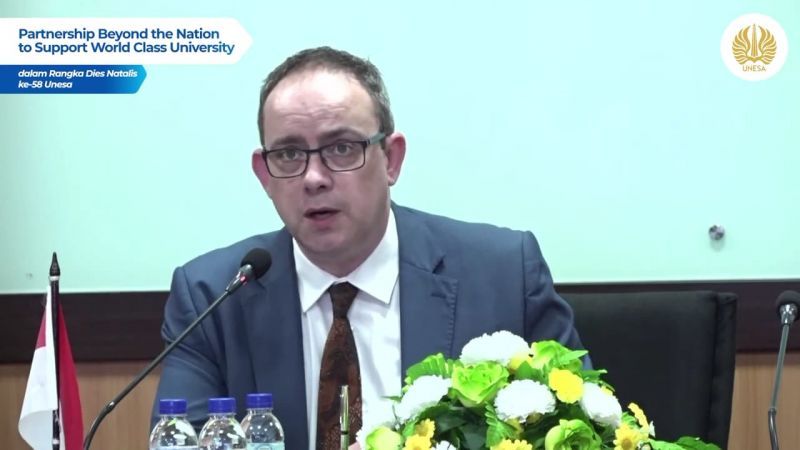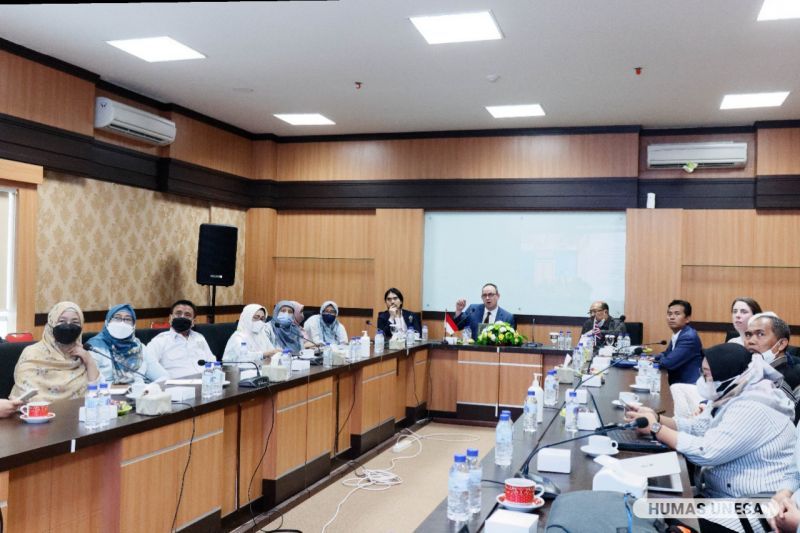
www.unesa.ac.id
Unesa.ac.id, SURABAYA-The State University of Surabaya (UNESA) is increasingly moving towards a world class university (WCU). International research and publications are continuously improved and cooperation with foreign institutions is strengthened. Yesterday (Monday, 06/06/2022) the 'One Step Ahead' campus held a webinar entitled 'Partnership Beyond the Nation to Support World Class University' with foreign experts on a hybrid basis.
The experts who attended were, 1) Bagus Muljadi, Coordinator of the UK-Indonesia Consortium for Interdisciplinary Sciences (UKICIS), as well as Assistant Professor of the University of Nottingham, UK, 2) David Ouchterlonie Associate Director, Global Engagement, University of Nottingham, UK, and 3) Prof. . Dr Shahriman Zainal Abidin Assistant Vice-Chancellor (Internationalization) UiTM Global.
David said that universities must think, act and innovate locally as well as across national and cultural boundaries. In addition, it is also required to adapt and promote the development of a global mindset as an integral part of the experience with students and lecturers across universities.
Campuses, especially in international cooperation, need to build awareness and openness to cultural diversity by providing digital and physical infrastructure, mentoring, and a work environment as well as cultural learning to enable students. Also train flexibility and emotional or cultural intelligence with strong intellectual abilities.
Priority Strategy
To get there, said David, there are 6 priority actions needed. First, international experience. Actions that can be taken are, developing a global welcome program for students that reflects the unique international perspective of the university and articulates a Global mindset.

www.unesa.ac.id
Then build global skills to encourage collaboration across structures and cultural boundaries. Reduce environmental impact, and improve global performance and effectiveness. "Build infrastructure to connect lecturers and students at every global campus to encourage professional and cultural exchanges," he explained.
Second, international partnerships. In this aspect, actions that need to be prioritized are building a digital infrastructure to facilitate data and creating a management information reporting mechanism that provides data. It then informs international activity and enables a tricampus approach to collaborative strategic partnership development.
In addition, developing a tri-campus global engagement strategy for priority countries countries, regions, and partnership networks. And, reduce environmental impact by implementing new virtual mechanisms to conduct initial collaborative discussions with new partners, reach new markets and expand our global reach through transnational education.
Third, the global curriculum. The action taken is the development of an open module that is accessed by lecturers and students. This open module, addresses current geopolitical issues from the perspective of a unique global university.
Fourth, international mobility. This priority action is to identify and remove internal barriers to mobility for faculty and students to promote working and studying at university as a unique global experience.
Then establish regular virtual forums, in collaboration with strategic partners, for lecturers and students on each campus to discuss and consider cutting-edge local and global issues. Review existing university-wide and local mechanisms and support lecturer mobility and recommendations.
“If any new initiatives are appropriate, review them to expand and enhance these opportunities across campus and beyond,” he said.
Fifth, campus culture. Action needed is to celebrate the global community through a series of on-campus and virtual festivals to promote intellectual and cultural exchange, establish exchange programs that connect international lecturers and diaspora students, and develop a Global mindset and international opportunities available to students.
Sixth, global reputation that can be done through cultural promotion by sharing international experiences and insights. Explores the potential to build an ambassador program where active colleagues and international students and alumni support, implement strategic reputation building activities with partners and networks in priority countries as part of a broader development campaign at the university. In addition, develop a platform to bring a global mindset to life for partners, lecturers, and international students.
Global Engagement
David also explained global engagement strategies for Indonesia, including, first, developing and expanding teaching, research and knowledge exchange strategies. Partnership to support the UK-Indonesia consortium's goals for interdisciplinary science (partnership development). Second, developing tri-campus executive education and CPD programs that are in line with Indonesia's national priorities (executive and police education).
Third, develop study abroad initiatives with partners. Fourth, build student and cultural exchanges. “By connecting Indonesian diaspora lecturers and students and those who are passionate about crossing universities without borders, there is automatically an exchange of knowledge that leads to international action and innovation,” explained David.
The event is part of the series of UNESA's 58th Anniversary which aims to strengthen international cooperation with foreign experts and institutions. The event was attended by UNESA leaders, deans and vice deans, heads of departments, heads of study programs and UNESA international affairs offices. [UNESA PR]
Author: Madina
Editor: @zam*
Share It On:






